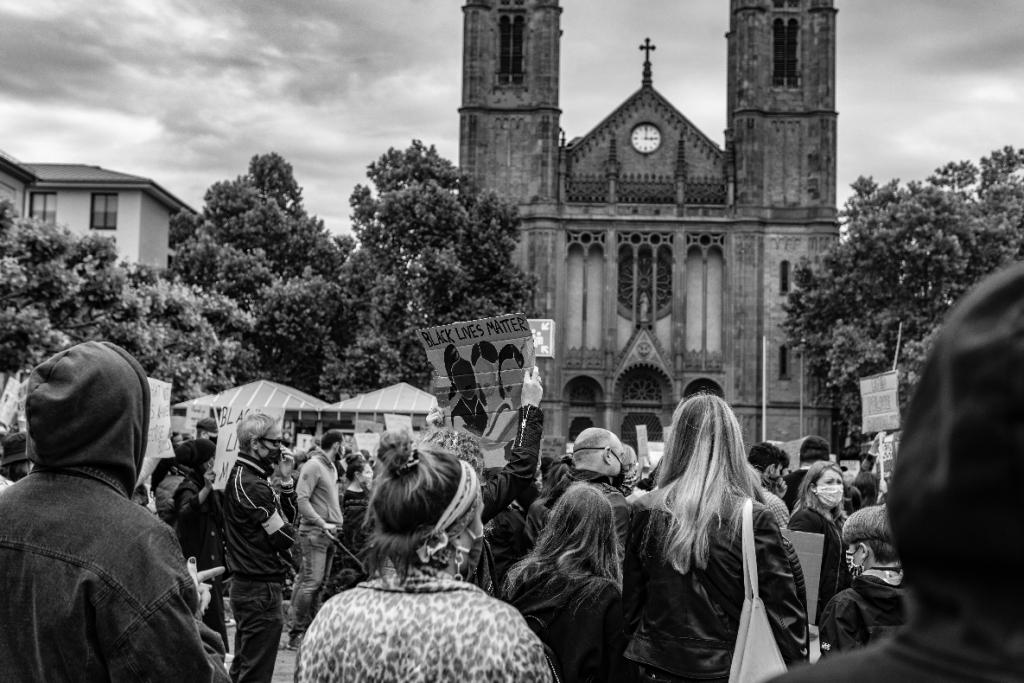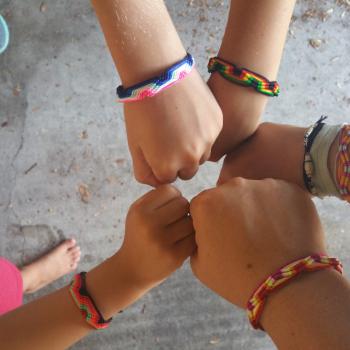Although the topic of justice might appeal to some Christians, many others avoid engaging in anything with the term “social justice” connected to it. In fact, especially in the evangelical circles I’ve spent most of my life in, these terms have been pitted against each other: Biblical justice vs. social justice, as if one is other righteous and holy while the other is inherently bad. If we want Christians to engage in the work of justice, we need to address these two terms to ask whether Biblical justice and social justice are the same thing or are actually on opposite sides of the spectrum.

How I Began Engaging in Justice Work
In my early twenties, I worked for a missions organization. Our primary goal was to share the gospel. But it became evident very quickly to me that the value of the good news was displayed through its practice, in the context of relationships and humanitarian work. Healing and restoration couldn’t be limited to a salvation prayer.
A couple years later, I married and moved to the suburbs of Washington D.C. At the time, it was the wealthiest region in the nation. I hated living there.
This new environment conflicted with many of my values, particularly one of the clearest requests I believe Jesus asked of us: to love your neighbor as yourself. The population of this area might have embodied the pursuit of happiness with excellence, but I only saw a facade protecting the rights of the privileged (who behind closed doors were still very broken). I was all too aware of the many trampled in the process of making the American Dream. The lack of regard for others and their human dignity crushed me. It was especially upsetting to observe that those who proclaimed Christianity lived the same way as everyone else, just for themselves, instead of adhering to what seemed evident to me in the Bible.
I didn’t know how to live with purpose and meaning in this space. This caused me to struggle with depression. I felt shame because I was here too, as one with privilege. Frequently I would break out of the societal lines and disrupt the status quo, with no regard for nuance (and likely with a lot of self-righteousness). I didn’t know how to navigate this tension. I found myself engaging in cultural wars and politics totally on the opposite side from my Christian upbringing.
Deconstructing My Faith Concerning Justice
This was a phase of deconstructing faith in my life, really evaluating what I believed, especially regarding the topic of justice. I compared my experience practicing the good news through my international work, to how we, as Christians lived within the American Dream. I spent time reevaluating Bible passages, looking at the context of verses, and studying what government looked like through the Old and New Testaments. I counted how often social issues were addressed, how they were addressed, and by whom within scripture. I came away confidently stating that God greatly cares about justice, especially when we are understanding it as wholeness, flourishing, and Shalom, as discussed in last week’s article.
What is Biblical Justice?
So what is Biblical justice? Simply put, Biblical justice is justice as defined by the Bible.
I began noticing that if I slapped the word “Biblical” in front of my conversations with others and teachings about justice, the term “justice” would suddenly become palatable to Christians around me! I wondered, though, if it was possible for any American to really be able to grasp what Biblical justice was without deconstructing and examining their faith significantly. I would challenge other Christians to do just that, asking them to study the Bible for themselves to grasp God’s compassion and heart for justice.
The Problem With Biblical Justice
However, even though defining Biblical justice is easy, it wasn’t so simple to name what was Biblical. Although I could see in scriptures what I thought God cared about and he didn’t care about in regards to the treatment of people and the way society was run, it was evident Christians couldn’t agree on this. I’d follow a podcast on Biblical justice and they might promote the entirely opposite things I thought they would!
And if we were unable to agree on what was important, how could we begin to act on what is good and right for all?
Biblical justice turned out to be confusing and subjective in practice.
What is Biblical Justice for the Poor?
For example, I knew God cared about the poor. Most Christians seemed to agree there was something to this. From the Old Testament to the New, I could point this out. I saw how God set up ancient Israel’s law to help the poor through government systems and concepts like microloans. I saw Jesus’ concern for those in need, and his challenges to his followers to care for these needs. He seemed to move beyond government political systems and actively came against religious political systems. I also noticed how not forgetting the poor was one of the few exhortations for new gentile converts.
Therefore, caring for the poor was Biblical justice, was it not?
But despite believing that caring for the poor was something I was confident God cared about, what were we supposed to do about it? Some Christian leaders told the churches around me that it was the faith communities’ jobs to do something, not the government’s. But too often they did next to nothing. Others felt it was their personal responsibility, not the religious systems. This could be effective on an immediate layer, but lacked societal change. One person in poverty might be helped by a Christian, but the rest of that Christian individual’s lifestyle might actually unintentionally be perpetuating poverty because of the systems they were within. I heard other Christian leaders telling us to leverage government systems, like increasing welfare. Other Christians decried this, saying people receiving help weren’t held accountable, which they also said was Biblical wisdom. It seemed everyone could make a case for what was the right way, often pulling out a scripture or two to prove theirs was the way of Biblical justice for the poor.
I was a pendulum and I was swinging.

What Is Social Justice?
I had posted all over Facebook about a bill I wanted people to sign. If passed, it would keep the minimal amount of foreign aid we had been distributing going–which affected millions of lives, but it was barely a blip from our U.S. budget. I knew this because I had a massive “Death and Taxes” poster on my wall showing me exactly where all our money was going that fiscal year, with the majority set aside for defense (or as I understood it, our self-protection). I must have used the term “social justice” in the post. A friend whom I’d previously worked at a crisis pregnancy center with messaged me, “Elisa, what is social justice to you?” She was kind about it, but she was still calling me out.
Before that, I hadn’t comprehended how often “social justice” was considered bad by many Christians. I interpreted the term literally, as fairness being established in all aspects of society because each human is valuable and equally matters. This seemed exactly in line with what I saw in the story through the Bible, where everyone values each other, humanity and creation is made right, treated right, we are able to live in peace under God’s perfect and good rule. Sure, I didn’t believe we would get to this utopia before Jesus return–not even close. But Jesus told us to pray, “your will be done, on earth as it is in heaven” and actually seemed to expect that we would live heaven-on-earth out. What else would you call social justice but acting on the hope for society’s restoration?
I wasn’t too far off from the official definitions of social justice either, just without God as the instigator, restorer, and center.
How Politics Influences Our View of Social Justice
Like this woman, it turned out that many of my Christian friends thought I was talking about a political scheme. She was the regional leader of the Republican political party. She assumed I had flipped and become a full-fledged communist liberal, ready to support a dictator and a particular agenda that was very clearly spelled out in her book. Maybe I should thank my previous lack of engagement in politics, but I was too naive to know what this particular agenda was. At the time, my approach to politics was basically trying to figure out what candidate’s policies would cause the least amount of collateral deaths, whether through war, abortion, poverty, etc….
What ensued was a good conversation about the different meanings of the term “social justice” to different people. I also took the opportunity to pick her brain to try to grasp why she felt her political beliefs lined up so well with scripture. Eventually, I ended up having similar conversations with people who were very firmly aligned with the Democrat party and then the Libertarian party. (I’ve yet to speak with a Christian leading in the Greenpeace party, but after writing for this publication, I know they’re out there!) Just like Biblical justice is to Christians, social justice to the world is subjective, too.
I appreciated understanding social justice from a political vantage point. However, to me it never seems to me that one political party can fully represent what I interpreted as Biblical justice. Nor can social justice be defined through just a political lens.
So What Is the Difference Between Biblical and Social Justice?
Social justice and Biblical justice might overlap in that they are both seeking a flourishing society, where all people equally experience what is good, right, and whole. Biblical justice can’t be informed by the current public outrage of what justice is, nor can it be defined by a political agenda. Biblical justice goes beyond opinion and the rise and fall of empires–it is informed by God’s eternal plan! And even if we might not agree on what Biblical justice is, let alone how to live it out, I am confident we can agree that social justice and Biblical justice aren’t in opposition with each other. Rather, we can pursue God’s justice, by whichever label we choose to call it, to live out the hope of restoration we so closely cling to in our Christian faith.












